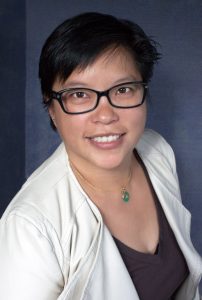Biography
Christine Ho Younghusband is an assistant professor in the School of Education at the University of Northern British Columbia (UNBC) and B.Ed. Coordinator of the UNBC Teacher Education Program. She has been a part of BC Education for over 25-years holding different roles ranging from teacher, parent, school trustee, and teacher educator. Christine graduated from the UBC Teacher Education Program in Secondary Education in 1994 after completing her degree in chemistry at UBC in 1993. She taught secondary mathematics and science for 16-years in BC public schools and held teacher leadership roles in professional development, mathematics department, and local association. Christine completed a Master of Education degree in Curriculum and Instruction from Simon Fraser University (SFU) in 2001, left teaching in 2010, and completed her Doctor of Education degree in Educational Leadership from SFU in 2017. During her doctoral studies, Christine was elected in 2011 as a school trustee serving 2-terms on the Board of Education and 3-years as director on the BC School Trustees’ Association Board of Directors. Her interests in mathematics and Indigenous education led her to opportunities to write for BC’s Curriculum, Open Schools BC, and First Nations Education Steering Committee. Christine has taught at SFU as a sessional instructor and currently teaches at UNBC and St. Mark’s College at UBC. She is a faculty senator, contributed to the B.Ed. and M.Ed. curriculum redesign, and loves working with Teacher Candidates. Christine is driven by innovation, collaboration, and student learning experiences and co-moderates #bcedchat on Twitter.
Meeting Christine
What is your most memorable experience from your time in the Faculty of Education?
I have a few memorable moments during my time at UBC in the Faculty of Education. My first memory was sharing, collaborating, and reflecting with my classmates about ideas and experiences from practicum. I remember us leaving the Scarfe building as we headed towards the SUB discussing what worked and didn’t work in mathematics education. Ironically, I worked with these same people on the Executive Committee of the BC Association of Mathematics Teachers (BCAMT) many years after we graduated. My second memory is stepping out of my box and innovating in one of my presentations on public speaking. I used the whole classroom to emphasize the importance of using space we teach. My third and most memorable experience was commuting to my practicum experience with one of the teachers at the school. I loved connecting and collaborating with him and others. It was a fun time to teach and learn.
Where has your education from the Faculty of Education taken you in your career?
The UBC Teacher Education Program opened the doors to my career and what was possible. I never thought I could or would become a teacher. After volunteering in Adult Basic Education, I was hooked. I was so grateful to be part of the Teacher Education Program at UBC. I had a fruitful career in BC Public Education as a secondary mathematics teacher, engaged in BC politics as a school trustee, and delved into graduate studies to become a teacher educator at UNBC.
Where do issues of inclusion find a place in your life or at work?
Issues of inclusion are ongoing in my work and personal life. Working with and beside Indigenous peoples in curriculum development and mathematics education have been integral to my understanding of the TRC, the history of Indigenous peoples in Canada, and cultural competencies in my practice and way of being. Admittedly, I am still learning, and it’s been a struggle with my own identity as a second-generation Chinese Canadian as I learn more about assimilation, policies, and cultural genocide. I am horrified. Teaching about Standard 9, the First Peoples Principles of Learning, and BC’s Curriculum are key to Teacher Education but also examining our biases, identities, and mindsets are integral to my work as a teacher educator. I am also part of the President’s Taskforce on Equity, Diversity, and Inclusion at UNBC as well as the Office of Indigenous Initiatives Pedagogy Committee to seek ways to develop a more inclusive working and learning environment. The work is difficult, but transformation is not supposed to be easy.
Do you have any words of wisdom for current students? Any advice for newly graduated folks?
Stay curious. Be open to unexpected twists and turns. Do not underestimate your greatness. We all have strengths and sometimes it takes time to develop or discover them. Enjoy the journey. It’s never going to be how you thought it would be. It’s even better. There will be challenging moments, but it’s in those gut-wrenching moments when change happens.
